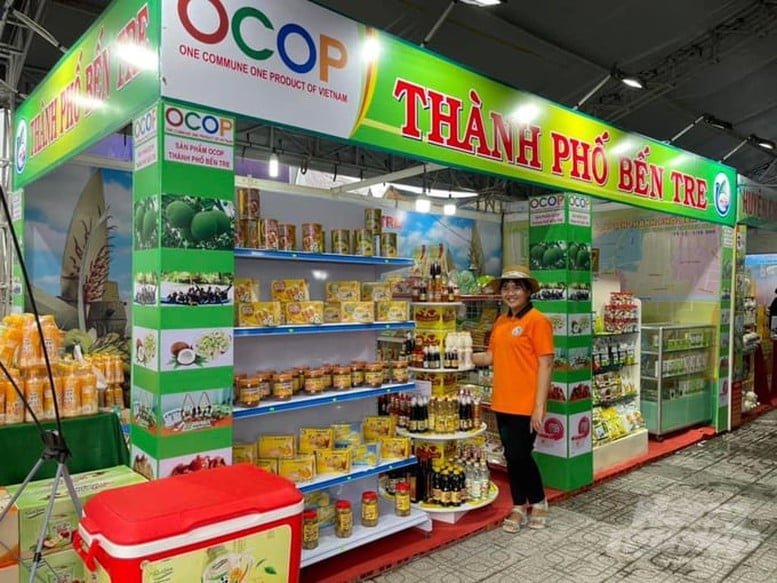More than 142 OCOP centers and sales points have been established nationwide.
Launched in 2018, the One Commune One Product (OCOP) program is not just an economic initiative but also a comprehensive strategy integrating economics, culture, society, and the environment. By the end of 2024, the country had over 13,000 OCOP products achieving 3 stars or higher, an increase of over 4,000 products compared to 2022. More than 5,600 OCOP entities, including cooperatives, businesses, and production facilities, have participated in the program, creating a widespread production and consumption network. Notably, the selling price of OCOP products increased by an average of 17%, with over 50% of products having higher prices than before certification, reflecting improvements in quality and market value.
To support the development of the OCOP program, more than 142 OCOP centers and sales points have been established, along with over 10,000 booths at provincial and regional fairs and exhibitions. These efforts help OCOP products access the market more easily, thereby enhancing their competitiveness. The total capital mobilized for the program reached VND 22,845 billion, accounting for 51% of the planned target, of which more than 93% came from OCOP organizations and credit, demonstrating proactiveness and creativity in resource mobilization.
The core of the OCOP program is to unleash the potential of local resources, focusing on distinctive, indigenous products owned and managed by the local community. The program not only helps increase income but also creates jobs and retains labor in rural areas. For example, in Ba Vi district ( Hanoi ), products such as fresh milk, Minh Hong vermicelli, and Ba Trai tea, which have achieved OCOP 3-4 star standards, have dominated the domestic market and are gradually being exported. The income of households producing OCOP vermicelli in Minh Quang commune is 15-20 times higher than that of traditional rice farming, demonstrating the self-reliance of modern farmers.
The OCOP program also opens up opportunities for the sustainable development of key agricultural products. Products such as Can Gio sand mangoes (Ho Chi Minh City) or roasted bean tea from Huong Bot establishment ( Quang Nam ), which have achieved 3-star OCOP certification, not only affirm their economic value but also become "cultural ambassadors," bringing local stories and essence to consumers. Preserving and developing distinctive products, from cuisine and handicrafts to traditional medicinal herbs, helps safeguard intangible cultural heritage in the era of globalization.
The program has also boosted the spirit of rural entrepreneurship. Many farmers, especially women and ethnic minorities, have boldly built brands for their products. According to statistics, 40% of OCOP participants are women and 17% are ethnic minorities, mainly in mountainous and disadvantaged areas. OCOP has helped them escape poverty, stabilize their lives, and become self-sufficient in the local economy.
Focus on quality and product integration.
According to the Central Office for New Rural Development Coordination, in order for the OCOP program to maximize its potential and meet expectations for the development of key agricultural products, a comprehensive approach involving multiple strategic directions is necessary. First and foremost, focus should be placed on improving product quality rather than chasing quantity. Some localities are currently prioritizing achievements over quality, registering too many OCOP products without sufficient depth in terms of quality, design, and competitiveness. To overcome this, training courses and specialized workshops should be organized to enhance knowledge and skills in production management, product development, and brand building for OCOP participants.
Secondly, the support policy system needs to be improved. Policies on preferential credit, technology transfer, trade promotion, and product advertising should be flexible, practical, and easily accessible. Local authorities should facilitate procedures, land, and production facilities, while encouraging businesses to invest in and develop the OCOP product value chain. The application of transparent quality control and traceability processes is also a key factor in building consumer trust and establishing brand recognition.
Thirdly, OCOP products need to leverage digital transformation to expand their market. The presence of OCOP products on e-commerce platforms such as Voso, Postmart, Lazada, and Shopee demonstrates the integration potential of the rural economy. Localities need to continue strengthening the connection of OCOP products with large distribution channels such as supermarkets and chains of clean agricultural product stores, while organizing regional and national OCOP fairs to expand market share both domestically and internationally. Building product display points in urban centers and tourist areas is also an effective way to promote local cultural values.
Finally, it is necessary to enhance the management and coordination role of local authorities. Close involvement from Party committees and authorities will help the program avoid being merely a fad or superficial approach, ensuring sustainable and effective development. Building a closed value chain and strengthening regional linkages are also crucial factors to prevent OCOP products from being abandoned midway.
The OCOP program not only focuses on developing the rural economy but also holds great promise in bringing Vietnam's key agricultural products to the international market. In a world that increasingly values local products, sustainable development, and traceability, OCOP possesses all the elements to become a national brand, not only in terms of products but also in terms of the people, culture, and self-reliance of the Vietnamese people.
If one day, Can Gio sand mangoes, Minh Hong vermicelli, or roasted mung bean tea appear in Tokyo supermarkets, on Parisian dining tables, or at Berlin food fairs, it will be proof of the success of the OCOP program in bringing key Vietnamese agricultural products to the world stage. This is not only a victory for farmers but also a success of a people-centered development strategy that harmoniously combines economics, culture, and the environment.
Do Huong
Source: https://baochinhphu.vn/ky-vong-phat-trien-nong-san-chu-luc-tu-chuong-trinh-ocop-102250422173954646.htm







![[Photo] Prime Minister Pham Minh Chinh presides over a meeting on private sector economic development.](/_next/image?url=https%3A%2F%2Fvphoto.vietnam.vn%2Fthumb%2F1200x675%2Fvietnam%2Fresource%2FIMAGE%2F2025%2F12%2F20%2F1766237501876_thiet-ke-chua-co-ten-40-png.webp&w=3840&q=75)





























































































Comment (0)